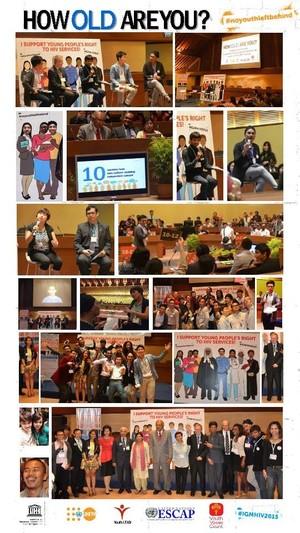
Old enough to marry, but too young to have consensual sex. Criminally responsible for one’s actions, but not legally entitled to HIV testing without parental consent. When it comes to legal and policy barriers keeping young people from accessing sexual and reproductive health (SRH) and HIV services in Asia-Pacific, the incongruities abound.
Indeed, for Asia-Pacific youth, “How old are you?” is a loaded question – the answer could throw up legal roadblocks to potentially life-saving health services and information.
Identifying such anomalies while also highlighting successes in removing these barriers was the topic of a side event to the Asia-Pacific Intergovernmental Meeting (IGM) on HIV and AIDS organized by UNESCO, UNFPA, ESCAP and regional youth networks Youth LEAD and Youth Voices Count, titled, “How Old Are You? Engaging young people to create an enabling legal environment for access to HIV and sexual and reproductive health services.”
The side event exemplified the commitment of organizers to bringing youth into the discussion as well as the dynamism and deep insights young people can offer when they do. Gautum Yadav, for example, a youth HIV rights advocate from India, brought home the effects of restrictive policy and legal environments and the types of mindsets they breed by recounting his own experiences as a young man, newly diagnosed with HIV.
"When I was about to [turn] 19, and I came to know that I was HIV positive, my CD4 count was 140, so the doctor forced me to call my parents ... to tell them that I'm HIV positive," he said. "At that time I was not below 18, so I could make my own decisions, but they told me that, 'If you don't tell your parents, we are not going to start your [treatment]."
For millions throughout the region below the age of 18, being HIV tested without parental consent is against the law, said John Godwin, an HIV and development researcher and consultant and the author of the 2013 report Young People and the Law published by UNESCO and its partners. "That can be a strong disincentive to a young person, particularly a young person from a key population.
"Asking for an HIV test from your parent would require discussing the fact that you are having sex, the fact that you are having homosexual sex, that you’re using drugs and in that young person's mind the consequences of that could be rejection from the family, being thrown out of the home, it could even be violence."
Even in countries that do not require parental consent for HIV testing, hazy confidentiality rules could still result in information on a young person's HIV status being communicated to their parents, guardians or others without the young person’s permission.
In line with this discussion, an infographic launched during the IGM illustrated how only 10 countries in the region have laws and policies enabling young people to access HIV testing and related services without parental consent, while all other Asia-Pacific countries either lack such provisions, have conflicting laws/policies, or have no information available on the subject. (Infographic)
“Across the region, the legal situation is not clear, whereas there are some confidentiality rules that are clear for adults, for minors the situation is less clear,” Godwin said.
Despite the challenges, Godwin noted that there have been improvements and that many of these can be attributed to the increasing prominence of young key populations in policy discussions.
"I’ve seen some good strides in countries involved in countries such as Indonesia through the ESCAP process. It was impressive to see young people from key populations front and center in those policy discussions. I think we’re starting to see an impact," he said. "At least now these items are on the agenda.”
Epeli Nailatikau, the President of Fiji and a prominent advocate for LGBT and human rights, attended the side event, even joining other dignitaries to pose for a photo behind a illustrated stand-up cut-out, with the message, "I support young people's right to HIV services" prominent overhead. (The cut-out featured in a wider social media campaign asking participants to share photos of themselves with it using #NoYouthLeftBehind).
Mr Nailatikau also addressed the event, saying "young people these days are mature, much more mature than we were in our time because they have access to everything. Why deny them what is going to be a cause of great concern to them in their future?" he asked.
"The people who are vulnerable are the young people. If we can help them we should – and we must."
"Young people and the Law in Asia and the Pacific: A review of laws and policies affecting young people’s access to sexual and reproductive health and HIV services" full review
Keep the conversation going at #NoYouthLeftBehind on Twitter.
Related Links:
Video: What would I want to change?
Changing the status quo for an HIV-free future
